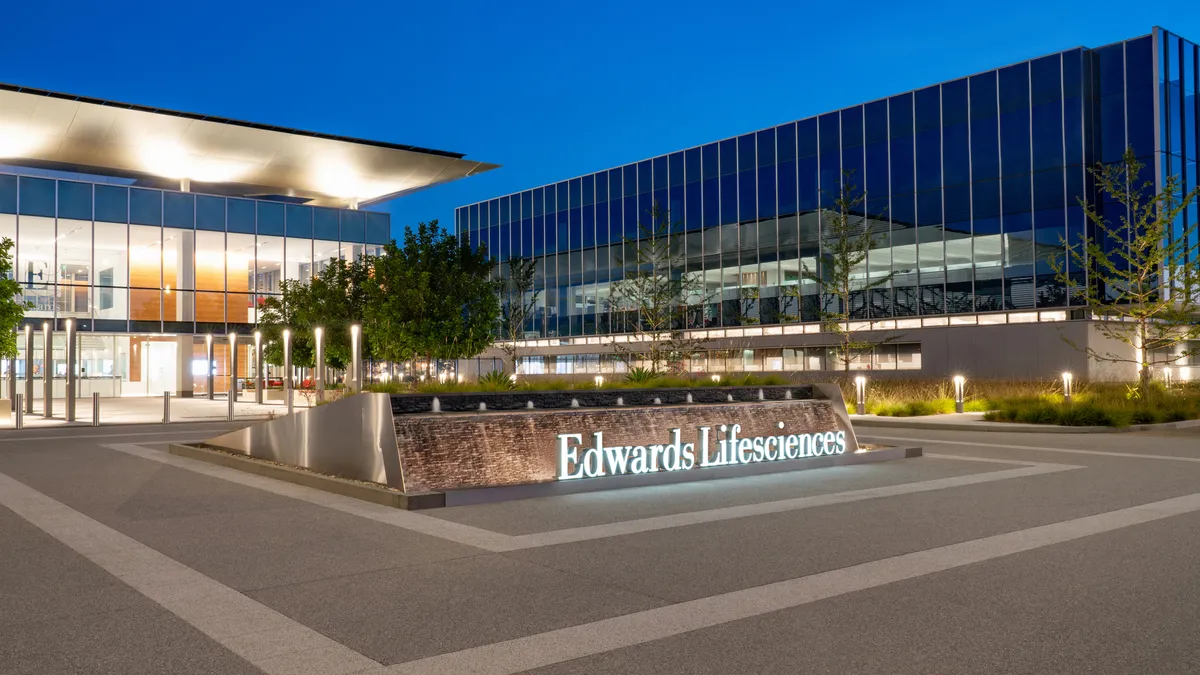Dive Brief:
- Edwards Lifesciences has received Europe’s CE mark for its transcatheter mitral valve replacement system, Sapien M3, the company said Monday.
- The device is designed for people with symptomatic mitral regurgitation who are unsuitable for surgery or transcatheter edge-to-edge therapy. Edwards said it is the world’s first system to treat mitral regurgitation using a transfemoral approach.
- Edwards is aiming to win approval for Sapien M3 in the U.S. next year, furthering its push to grow sales of its transcatheter mitral and tricuspid therapies to $2 billion by 2030.
Dive Insight:
Edwards is building a multi-product TMTT portfolio. The company received CE marks for its Pascal mitral and tricuspid valve repair devices in 2019 and 2020, respectively, and for the Evoque tricuspid valve replacement device in 2023. The CE mark for Sapien M3 means Edwards can now offer devices to repair and replace mitral and tricuspid valves in the European Union.
Edwards CEO Bernard Zovighian discussed the need for the portfolio approach at an investor conference in December. The patient population is “very complex, very diverse, large and growing,” Zovighian said. That led Edwards to go “big from the beginning,” the CEO said, by developing multiple devices in parallel.
The company has predicted TMTT sales will grow 50% to 60% this year to reach at least $500 million. The Pascal system for mitral valve repair and Evoque for tricuspid valve replacement, which the Food and Drug Administration authorized in 2022 and 2024, respectively, are the current growth drivers. As Sapien M3 and Pascal tricuspid reach the U.S. market, Edwards is predicting sales will hit $2 billion by 2030.
When Edwards made its prediction in December, J.P. Morgan analyst Robbie Marcus said $2 billion is “much higher than what I was thinking.” Daveen Chopra, corporate vice president of TMTT at Edwards, justified the forecast by saying the demand for Evoque is stronger than he has ever seen and predicting the same interest in Sapien M3.
The CE mark positions Edwards to start trying to deliver on that prediction, but FDA approval will be the key potential inflection point for Sapien M3. The mitral valve replacement system is launching into markets already served by mitral valve repair devices, namely Edwards’ Pascal and Abbott’s Mitraclip.
TD Cowen analyst Joshua Jennings said at an event last month that “the consensus view is that repair will be the dominant approach for a while.” Edwards CFO Scott Ullem agreed, explaining that the “mitral repair technologies have been around for quite a long time now, so for some period of time that will certainly be the largest sales driver.” Even so, Ullem sees a need for valve replacement.
“We do think that mitral replacement offers an important alternative for physicians to consider for patients who have regurgitation and for where TEER may not be the best solution,” Ullem said. “We think it's a complement and will be a real growth opportunity alongside TEER for mitral regurgitation.”
Edwards will report on the commercial progress of its TMTT portfolio in its first-quarter results on April 23. BTIG analysts said in a note to investors that they are modeling TMTT sales of $114.5 million, around $2 million more than the consensus estimate of their peers. The analysts expect TMTT sales to step up in the third quarter, with the first quarter accounting for around 20% of their full-year forecast.
The company is looking to TMTT to support sales growth at a time when the larger transcatheter aortic valve replacement business has slowed. BTIG analysts are predicting TAVR sales will grow 3% in the first quarter. Edwards has forecast full-year TAVR sales will grow 5% to 7%. That outlook assumes a mid-year label expansion supported by data in asymptomatic severe aortic stenosis patients.











